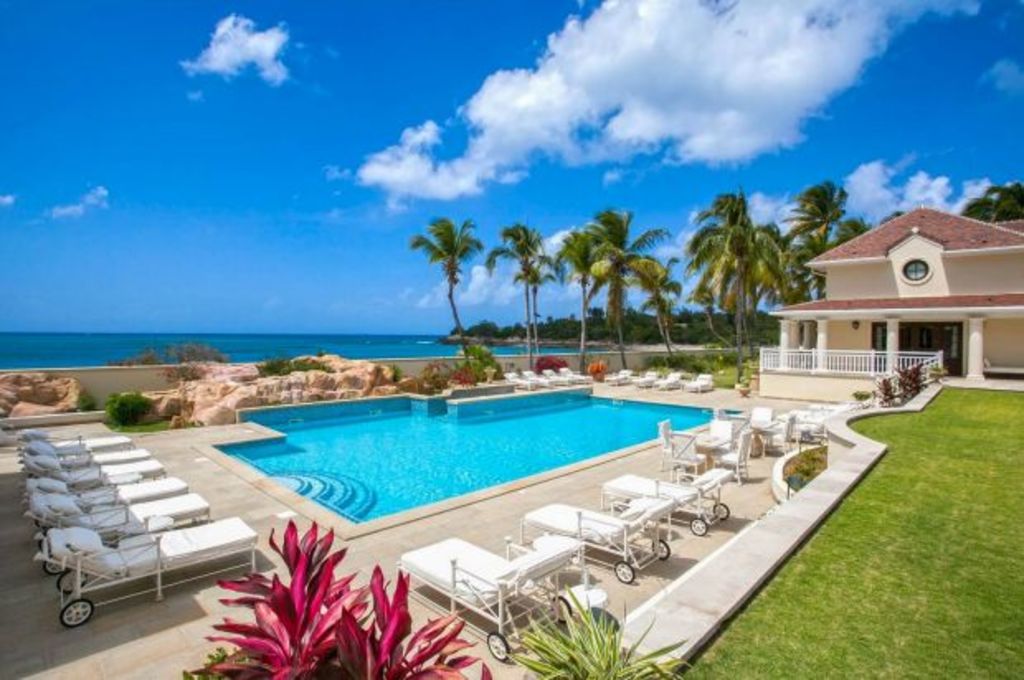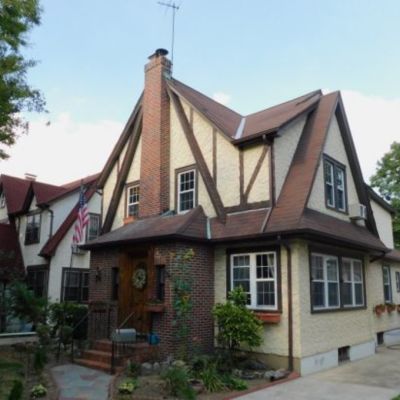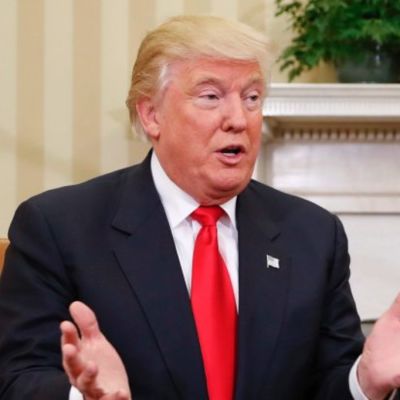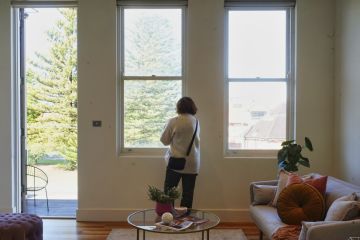Donald Trump's Caribbean estate on the market for $37.6 million, prompting questions

The opulent beachfront estate that recently went on the market on the Caribbean island of St. Martin has a number of appealing factors, including two elaborately adorned villas and an expansive pool overlooking the crystalline waters of Plum Bay.
And there’s another unique aspect that nearby properties can’t claim: It is owned by the president of the United States.
Le Chateau des Palmiers, which President Donald Trump described as “one of the greatest mansions in the world” when he bought it in 2013, was quietly listed for sale last month on the website of Sotheby’s International Realty, whose St. Martin office noted coyly in an Instagram post, “It’s huuuuuge!” The price, according to a person familiar with the listing: $US28 million ($37.6 million).
It’s unclear why the property is for sale. It earned Trump between $200,000 and $2 million in rental fees between 2014 and mid-2016, according to financial disclosures. Officials with the White House and the Trump Organization did not respond to repeated requests for comment.
The effort to sell the high-priced estate in the midst of Trump’s tenure could present a similar ethical problem to the one his lawyer cited in defending his decision not to sell off his company after the election: that a buyer could overpay as a way to gain currency with the president.
If the estate is sold, the public probably would learn little, if anything, about who has purchased it.
Public records in the French territory do not always show details of private property transactions. Trump would eventually have to disclose the sales price on his financial disclosure form – a report detailing 2017 transactions must be filed in the spring of 2018 – but he would not be required to reveal the identity of the buyer.
In January, before his inauguration, Trump placed his business holdings in a revocable trust overseen by his son Donald Jr. and longtime Trump Organization executive Allen Weisselberg. He said he was turning over management of the Trump Organization to his two eldest sons, who Trump said are “not going to discuss it with me.”
However, experts said Trump did not give up control of his assets under the trust agreement.
The trust appears to be seeking substantially more for the St. Martin residence than Trump paid the previous owners, Steve Hilbert and his wife, Tomisue Hilbert, an Indiana businessman who had licensed a caviar-based skin-care line developed by Melania Trump, sold Donald Trump the house in 2013. At the time, the Hilberts were seeking $19.7 million for the oceanfront compound, although the final sales price was never disclosed.
Lesley Reed, the Sotheby’s agent who is representing the property, declined to comment on the current listing, citing a nondisclosure agreement.
The palm tree-ringed estate – whose name translates as “Castle of the Palms” – covers more than two hectares and includes a tennis court and a fitness centre. There are nine bedrooms between the oceanside villa and garden villa, including a two-story master suite, as well as a commercial-size catering kitchen and media room. Chandeliers, marble floors, gold-hued wallpaper and heavy gold curtains dominate the interior, according to photos accompanying the listing – decor that dates to the Hilbert’s ownership, say people who toured it then.
A website that aggregates luxury properties, 7th Heaven Properties, initially listed Chateau des Palmiers with an asking price of $28 million, although it subsequently changed it to “price on application,” per the Sotheby’s request, according to a 7th Heaven representative.
Four St. Martin real estate agents told The Washington Post that the $28 million price tag far outstrips the amount that sellers are getting for the most exclusive properties on the Caribbean island, where the market is still rebounding from the 2008 banking crisis.
Owners of the most luxurious homes on the market are asking $15 million to $17 million, agents said. A 10-bedroom hillside estate on a lot adjacent to Chateau des Palmiers is for sale for $4.75 million.
“It’s a lot of money,” Hanneke Snow, the owner of Re/Max Island Properties, said of the price for the president’s property. “If it were in St. Barts, you would have a bigger chance. But if the name Trump is attached to it, people may want to see it.”
Arun Jagtiani, the owner of Island Real Estate Team, said he thinks the property is “overpriced by about $10 million.”
“If someone does pay anything close to the asking price, it will be because they are paying a premium to say they own a property that was once owned by President Trump,” Jagtiani said.
Jagtiani has had at least one client whose interest was piqued by the estate’s lineage. In February 2016, as Trump’s profile in the Republican presidential primaries was rising, Jagtiani said he was showing estates in the area to a Russian investor and mentioned that Chateau des Palmiers was owned by the New York developer.
“He seemed to light up when we mentioned the name ‘Trump,’ ” said Jagtiani, who declined to share his client’s name. “He seemed very excited and asked to see it. He wasn’t clear if he was looking for himself or a friend. But he was intrigued.”
Even though the property was not on the market, the Russian investor arranged to tour the estate but never followed up after viewing it, he said.
The sale of the St. Martin estate would be one of the biggest transactions involving Trump’s assets since he took office.
In January, in response to calls for him to divest his real estate empire, Trump attorney Sheri Dillon said that selling all his holdings could actually “exacerbate” possible conflicts of interest.
“Whatever price was paid would be subject to criticism and scrutiny,” Dillon said at a news conference. “‘Was it too high, is there pay-for-play, was it too much pay to curry favor with the president-elect?'”
Dillon declined to comment for this story.
To navigate potential conflicts, Trump tapped Republican lawyer Bobby Burchfield to serve as his outside ethics adviser. He also named George Sorial, a longtime Trump Organization executive, to serve as chief compliance officer.
It is unknown what limits, if any, they have put on the St. Martin sale. Burchfield declined to comment, referring calls to the Trump Organization officials, who did not respond to a list of detailed questions on the matter.
Don Fox, a former general counsel and acting director of the Office of Government Ethics, said if he were advising Trump, he would suggest that he take the estate off the market.
“Mr. President, why the urgency to sell this property?” Fox said. “Why not hang on to it, continue to collect rent, and then at then end of the term, sell it to whoever you want for whatever price you can get? It takes the issue out of play.”
Trump’s 2013 purchase of the estate was a byproduct of a bitter legal fight between Hilbert and another business titan.
Trump had been a regular guest at Chateau des Palmiers when it was owned by Hilbert, who headed the Indiana-based insurance company Conseco, according to court documents and the property’s website at the time. In 1998, the two joined forces to purchase the General Motors Building on New York’s Fifth Avenue and soon were vacationing together in St. Martin and other locales.
On a now-defunct website that advertised rentals of Chateau des Palmiers, Tomisue Hilbert noted that guests included “many of the NBA’s greatest stars and some of the world’s most powerful people, including Donald Trump” and “many Hollywood celebrities.”
Around 2010, the Hilberts began trying to sell the St. Martin retreat, initially seeking $29 million, according to court records. Three years later, it was still on the market, and the asking price was down to $19.7 million.
Around the same time, Hilbert’s legal battle erupted with billionaire John Menard, the founder of a home-improvement store chain who had partnered with Hilbert on an investment fund. Caught in the middle was Melania Trump’s skin-care line, which Hilbert had licensed through a company financed by the Menard fund.
In the late summer of 2013, shortly before Melania Trump was deposed in the case, Donald Trump purchased the St. Martin estate, according to court records.
“Because of the horrible position that this unfounded ridiculous litigation has put us into, we had to sell the home,” Hilbert testified in federal court, according to a transcript. “So I went to Donald and asked if he would buy it.”
Neither Hilbert nor Menard responded to requests for comment.
Donald Trump proudly announced his new purchase in an email to Trump Organization clients, calling it “the jewel in St. Martin’s crown” and offering it for weekly rentals, according to a copy of his message included in legal filings.
“By all accounts Le Chateau des Palmiers is considered to be one of the greatest mansions in the world,” he wrote.
He or his family appeared to visit the island frequently in 2014. Trump-owned aircraft flew into the St. Martin airport at least six times that year, according to Federal Aviation Administration records.
The flights tapered off in 2015, the year Trump launched his presidential bid. Since then, the property appears to have been used largely for rentals.
“You’ll feel almost presidential when you stay in Chateau Des Palmiers,” read a Sotheby’s Instagram post promoting the estate around Election Day last fall. “This place is huge.”
Its $28 million asking price makes the Trump property the 12th-most expensive home on the market in the Caribbean, according to Point2 Homes, a website that aggregates international real estate listings.
The home’s gilded style might appeal to a relatively narrow market, agents said.
“There is certainly a lot of ‘wow’ factor to the property,” Jagtiani said. “The location is stunning. But I’ve seen mixed reviews for the decor. There is a lot of gold in there. It’s rather gaudy, if you will.”
Maayke de Haan, the owner of Antilles Realty, described the look as “very old-fashioned.”
“It’s a style that does not appeal to everybody,” she said, but added, “the finishings are stunning for the right clients.”
Jonathan Schaede, a broker with Sunshine Properties, said the listing for Chateau des Palmiers has drawn some inquiries, but mostly from people “calling for curiosity reasons.”
“I think it’s going to be very interesting when it does sell,” he said. “The world is looking to see who is going to buy this property.”
“If a Russian person falls in love with the house, how would the world react to it?” Schaede added. “Or if someone from China or Saudi Arabia? It’s definitely not an easy transaction at this particular time.”
This article originally appeared in The Washington Post.
We recommend
We thought you might like
States
Capital Cities
Capital Cities - Rentals
Popular Areas
Allhomes
More









